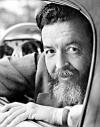Each day brings its toad, each night its dragon.
Der heilige Hieronymus--his lion is at the zoo--
Listens, listens. All the long, soft, summer day
Dreams affright his couch, the deep boils like a pot.
As the sun sets, the last patient rises,
Says to him, Father, trembles, turns away.
Often, to the lion, the saint said, Son.
To the man the saint says--but the man is gone.
Under a plaque of Gradiva, at gloaming.
The old man boils an egg. When he has eaten
He listens a while. The patients have not stopped.
At midnight, he lies down where his patients lay.
All night the old man whispers to the night.
It listens evenly. The great armored paws
Of its forelegs put together in reflection.
It thinks: Where Ego was, there Id shall be.
The world wrestles with it and is changed into it
And after a long time changes it. The dragon
Listens as the old man says, at dawn: I see
--There is an old man, naked in a desert, by a cliff.
He has set out his books, his hat, his ink, his shears
Among scorpions, toads, the wild beasts of the desert.
I lie beside him--I am a lion.
He kneels listening. He holds in his left hand
The stone with which he beats his breat, and holds
In his right hand, the pen with which he puts
Into his book, the words of the angel:
The angel up into whose face he looks.
But the angel does not speak. He looks into the face
Of the night, and the night says--but the night is gone.
He has slept. . . . At morning, when man's flesh is young
And man's soul thankful for it knows not what,
The air is washed, and smells of boiling coffee,
And the sun lights it. The old man walks placidly
To the grocer's; walks on, under leaves, in light,
To a lynx, a leopard--he has come;
The man holds out a lump of liver to the lion,
And the lion licks the man's hand with his tongue.






